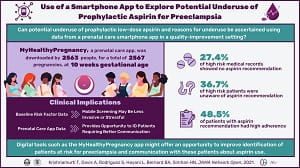
10/29/2021
PITTSBURGH – Low-dose aspirin during pregnancy can help prevent preeclampsia, a serious, yet common, hypertension disorder—but it is underused among high-risk pregnant patients, potentially due to a communication gap with providers, according to a new study published today in
JAMA Network Open.
The study evaluated
preeclampsia risk and a patient’s adherence to aspirin recommendations by comparing medical records to results of patient surveys conducted with the
MyHealthyPregnancy smartphone app, which was developed by
UPMC,
University of Pittsburgh and
Carnegie Mellon University researchers. Among patients who reported at least one high-risk factor for preeclampsia and had a low-dose aspirin recommendation documented in their medical records, about 37% were unaware they’d been advised to take the medication. The app could help bridge this gap and improve adherence to clinical guidance, say the researchers.

“We see this app as a way to augment the patient-provider dyad,” said senior author
Hyagriv Simhan, M.D., professor and executive vice chair of obstetrical services at Pitt and director of clinical innovation for the Women’s Health Service Line at
UPMC Magee-Womens Hospital. “This digital tool has potential to offer additional support and information for patients to navigate on their own and also facilitate further conversation with their providers about aspirin eligibility. This could empower patients to make more informed decisions for a healthy pregnancy.”
Preeclampsia can lead to serious, even fatal complications for both mother and baby. This condition can damage the mother’s organs and impact the placenta, restricting fetal growth and increasing the risk of preterm delivery and stillbirth. Daily low-dose aspirin can prevent preeclampsia and reduce these risks, and the
U.S. Preventive Services Task Force recommends this medication for pregnant people with at least one high-risk factor or at least two moderate risk factors. However, identifying people with these risk factors and communicating aspirin recommendations are a challenge.

“We built the MyHealthyPregnancy platform—which is a patient-facing smartphone app and a provider-facing portal—to help with identification of preeclampsia risk factors and other risks related to preterm birth earlier than possible through routine prenatal care,” said lead author
Tamar Krishnamurti, Ph.D., assistant professor of medicine and clinical and translational science at the
Pitt School of Medicine.
Simhan, Krishnamurti and their team analyzed data from pregnant participants who responded to optional questions about preeclampsia risk on the app. Of that group, 124 participants had one or more high-risk criteria and also answered voluntary questions about aspirin. The medical records of 90 patients contained documented evidence that providers had advised them to take a low-dose aspirin, but only 57, or 63%, were aware of the recommendation; the other 37% didn’t recall this advice.
“The finding that many patients didn’t recall an aspirin recommendation highlights that there is huge opportunity to improve information-sharing,” said Krishnamurti. “We had incredibly high engagement with participant responses to voluntary questions through the MyHealthyPregnancy app, so there is real opportunity to leverage this engagement to bridge communication gaps between providers and patients.”
Thirty-four of 124 patients with at least one high-risk criterion said that they had not been recommended aspirin, in line with their medical records. In addition, of 441 participants with two or more moderate-risk criteria who answered questions related to aspirin, only 3% to 6% reported that they had been advised to take low-dose aspirin. These findings suggest that providers may miss certain risk factors and that many patients who could benefit from low-dose aspirin are not receiving these recommendations.

Of all the participants who reported receiving an aspirin prescription, only about 49% said that they took the medication in adherence with guidelines, highlighting a challenge in health care known as “non-adherence,” where patients do not follow provider recommendations.
The researchers say that the MyHealthyPregnancy digital platform could help flag patients with preeclampsia risk factors to providers and increase adherence by improving communication about potential benefits of aspirin and reminding patients to take medication.
“The app could provide a more nuanced understanding of aspirin use for preeclampsia than there may be time for during a provider appointment,” explained Simhan.
Because the vast majority of U.S. adults own a smartphone, the researchers say that digital tools like the app could contribute to addressing
racial disparities in preeclampsia rates by identifying people at risk early in their pregnancy.
The app currently is offered only to patients in the UPMC network by prescription, but the researchers will next test it in other health care systems and hope to make it available more widely in the future.
Other authors on the study were Alexander L. Davis, Ph.D., Carnegie Mellon University; Samantha Rodriguez, M.S., and Laila Hayani, M.S.,
Naima Health LLC; and Miriam Bernard, B.A., Pitt.
Several authors have a financial stake in the MyHealthyPregnancy app; this is disclosed in the JAMA Network Open paper. UPMC has a financial interest in the MyHealthyPregnancy app.
PHOTO INFO: (click images for high-res versions)
Top:
CAPTION: Hyagriv Simhan, M.D., professor and executive vice chair of obstetrical services, University of Pittsburgh School of Medicine, and director of clinical innovation for the Women’s Health Service Line at UPMC Magee-Womens Hospital.
CREDIT: UPMC
Middle:
CAPTION: Tamar Krishnamurti, Ph.D., assistant professor of medicine and clinical and translational science, University of Pittsburgh School of Medicine.
CREDIT: UPMC
Bottom:
CAPTION: A new JAMA Network Open study suggests that a pregnancy smartphone app could boost communication between pregnant patients and providers around low-dose aspirin use for preeclampsia, a serious, yet common, hypertension disorder.
CREDIT: University of Pittsburgh Division of General Internal Medicine

 “We see this app as a way to augment the patient-provider dyad,” said senior author Hyagriv Simhan, M.D., professor and executive vice chair of obstetrical services at Pitt and director of clinical innovation for the Women’s Health Service Line at UPMC Magee-Womens Hospital. “This digital tool has potential to offer additional support and information for patients to navigate on their own and also facilitate further conversation with their providers about aspirin eligibility. This could empower patients to make more informed decisions for a healthy pregnancy.”
“We see this app as a way to augment the patient-provider dyad,” said senior author Hyagriv Simhan, M.D., professor and executive vice chair of obstetrical services at Pitt and director of clinical innovation for the Women’s Health Service Line at UPMC Magee-Womens Hospital. “This digital tool has potential to offer additional support and information for patients to navigate on their own and also facilitate further conversation with their providers about aspirin eligibility. This could empower patients to make more informed decisions for a healthy pregnancy.” “We built the MyHealthyPregnancy platform—which is a patient-facing smartphone app and a provider-facing portal—to help with identification of preeclampsia risk factors and other risks related to preterm birth earlier than possible through routine prenatal care,” said lead author Tamar Krishnamurti, Ph.D., assistant professor of medicine and clinical and translational science at the Pitt School of Medicine.
“We built the MyHealthyPregnancy platform—which is a patient-facing smartphone app and a provider-facing portal—to help with identification of preeclampsia risk factors and other risks related to preterm birth earlier than possible through routine prenatal care,” said lead author Tamar Krishnamurti, Ph.D., assistant professor of medicine and clinical and translational science at the Pitt School of Medicine.  Of all the participants who reported receiving an aspirin prescription, only about 49% said that they took the medication in adherence with guidelines, highlighting a challenge in health care known as “non-adherence,” where patients do not follow provider recommendations.
Of all the participants who reported receiving an aspirin prescription, only about 49% said that they took the medication in adherence with guidelines, highlighting a challenge in health care known as “non-adherence,” where patients do not follow provider recommendations. 















